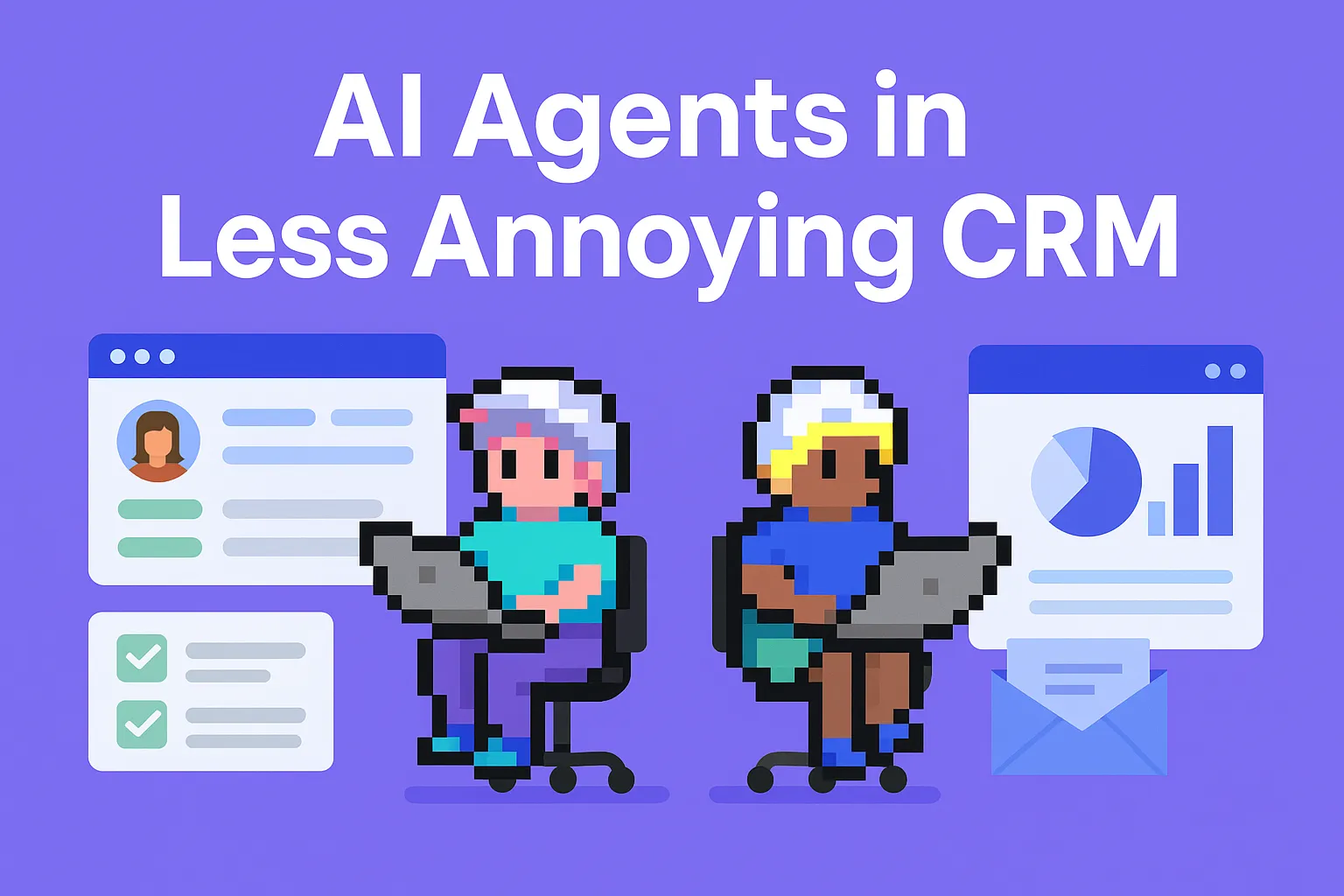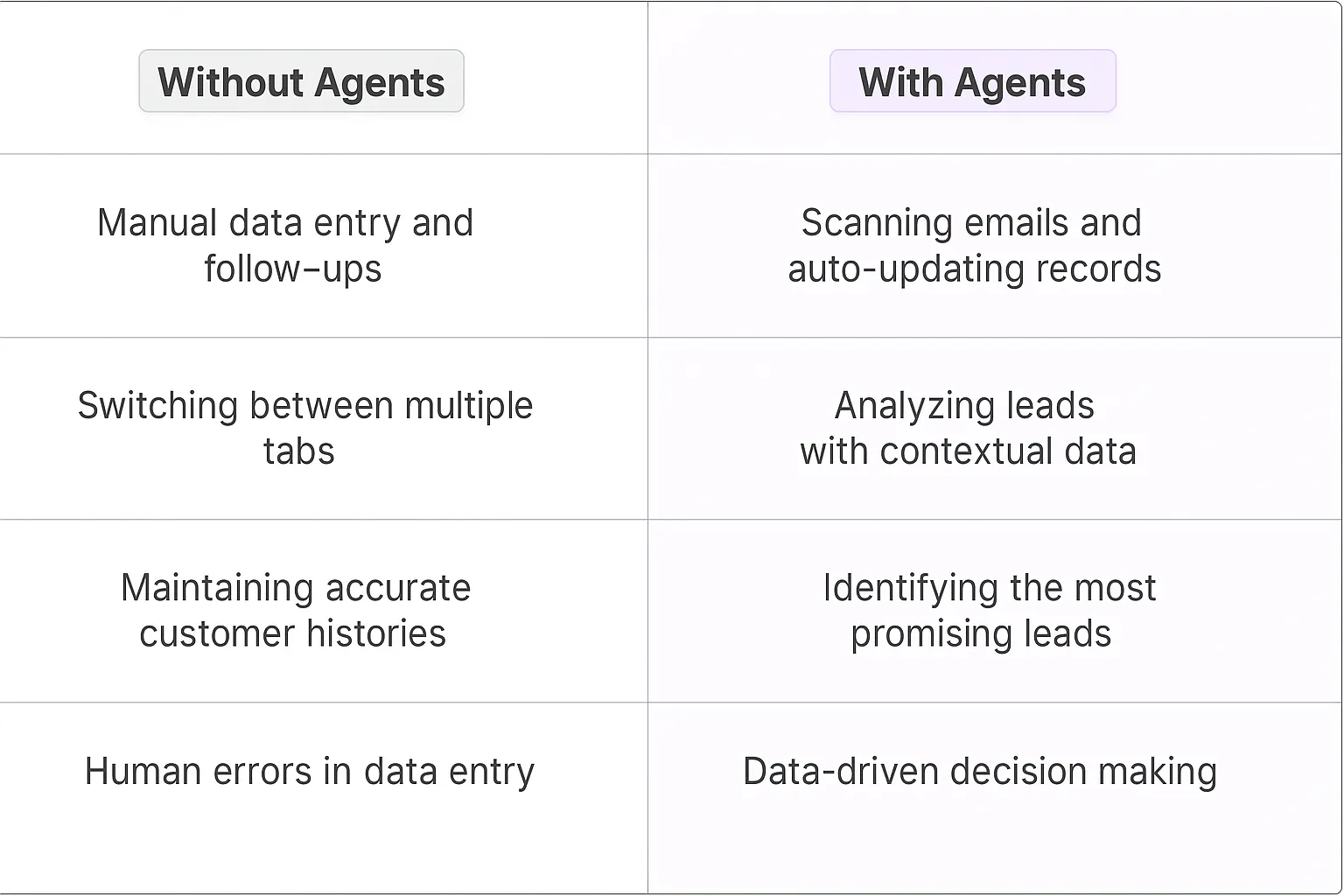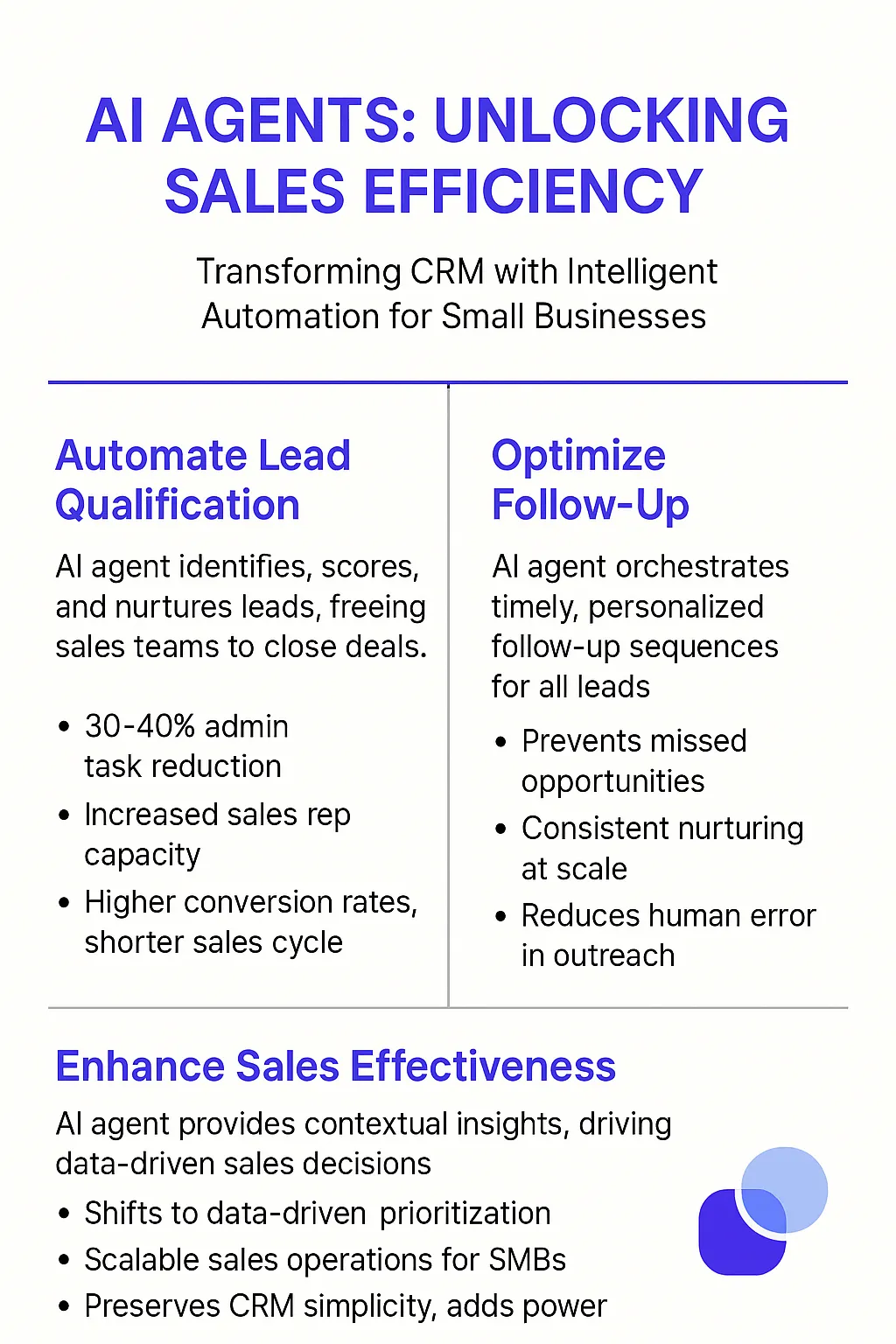Less Annoying CRM
Understanding Less Annoying CRM's Core Platform
Less Annoying CRM stands out as a straightforward, user-friendly customer relationship management platform designed specifically for small businesses. The platform prioritizes simplicity and effectiveness, offering essential contact management, lead tracking, and task organization features without overwhelming users with unnecessary complexity.
Key Features of Less Annoying CRM
The platform excels in core CRM functionalities including contact management, calendar integration, and pipeline tracking. Its unified interface puts all customer information in one place, while the built-in calendar helps teams stay coordinated. The lead management system tracks prospects through sales pipelines, and custom fields allow businesses to tailor the platform to their specific needs. With the addition of AI Agents, these features become more powerful and intelligent, working proactively to support business growth.

Benefits of AI Agents for Less Annoying CRM
What would have been used before AI Agents?
Traditional CRM workflows relied heavily on manual data entry, repetitive follow-ups, and time-consuming customer interaction logging. Sales teams spent countless hours updating contact records, scheduling follow-ups, and trying to maintain accurate customer histories. The standard approach involved toggling between multiple tabs, copying and pasting information, and dealing with inevitable human errors in data entry.
What are the benefits of AI Agents?
AI Agents transform Less Annoying CRM from a basic contact management system into an intelligent digital teammate that actively participates in the sales process. These agents scan incoming emails and automatically update contact records, ensuring every customer interaction is captured without manual intervention.
The real power emerges in how AI Agents handle lead qualification. They analyze communication patterns, engagement levels, and historical data to identify which leads are most likely to convert. This moves sales teams away from gut-feel prioritization to data-driven decision making.
A key advantage lies in the automated follow-up sequences. AI Agents monitor response times and engagement patterns, then adjust outreach timing and frequency accordingly. When a prospect shows high engagement signals, the system can automatically escalate them to a sales representative.
For small businesses, the impact is particularly significant. AI Agents effectively function as a virtual sales operations team, handling the administrative burden that previously consumed 30-40% of a salesperson's day. This shifts more time toward high-value activities like building relationships and closing deals.
The intelligence layer also provides contextual insights during customer interactions. AI Agents surface relevant historical information, identify potential pain points, and suggest talking points based on past conversations - all without requiring the user to dig through records manually.
Most importantly, these capabilities maintain the simplicity that Less Annoying CRM is known for. The AI operates behind the scenes, enhancing the experience without adding complexity to the interface.

Potential Use Cases of AI Agents with Less Annoying CRM
Processes
AI agents transform how teams interact with Less Annoying CRM by handling complex data management and customer relationship tasks. These digital teammates excel at maintaining pristine contact records, enriching customer profiles with relevant data, and ensuring information stays current across the platform.
The agents can monitor customer interactions, automatically categorize them by priority, and flag important changes in customer status. They're particularly effective at identifying patterns in customer behavior that might indicate opportunities for upselling or risks of churn.
Tasks
Contact Management and Organization- Automatically update contact information from email signatures and communications- Sort and tag contacts based on interaction history and engagement levels- Identify and merge duplicate contact records- Create detailed contact summaries from scattered communication threads
Pipeline Management- Track deal progress and automatically update pipeline stages- Generate probability scores for deal closure based on historical patterns- Alert sales teams about stalled opportunities- Create detailed activity logs for each prospect interaction
Follow-up Coordination- Draft personalized follow-up emails based on previous conversations- Schedule optimal times for follow-up communications- Generate meeting preparation briefs with relevant customer history- Create task reminders based on customer interaction patterns
Reporting and Analytics- Generate custom reports on sales activities and outcomes- Analyze customer communication patterns to identify trends- Track team performance metrics and highlight areas for improvement- Create forecasting models based on pipeline data
Data Quality Management- Validate and standardize contact information- Flag outdated or incomplete records- Maintain consistent data formatting across fields- Monitor data entry accuracy and completeness
The integration of AI agents with Less Annoying CRM creates a more dynamic and responsive system that amplifies human capabilities while maintaining the platform's core promise of simplicity and ease of use. These digital teammates handle the heavy lifting of data management and routine tasks, allowing sales teams to focus on building meaningful customer relationships.

Industry Use Cases
AI agents in Less Annoying CRM represent a significant shift in how businesses manage customer relationships. These digital teammates adapt to specific industry needs, creating meaningful impact across different business sectors. The real power lies in their ability to handle complex customer interactions while maintaining that essential human touch.
What makes this particularly fascinating is how AI agents transform traditional CRM processes into dynamic, responsive systems. They're not just handling data - they're actively participating in customer journey mapping, lead qualification, and relationship nurturing. This shift mirrors what we've seen in other technological leaps: when tools become teammates, the entire operational paradigm changes.
From small retail operations to large B2B enterprises, AI agents in Less Annoying CRM demonstrate remarkable versatility. They excel at identifying patterns in customer behavior, automating follow-ups, and maintaining detailed interaction histories - all while keeping the interface simple and accessible. This combination of sophistication and simplicity is what makes their industry applications particularly compelling.
Real Estate Agents Maximize Client Relationships with Less Annoying CRM AI
Real estate professionals juggle dozens of active listings, buyer inquiries, and follow-ups daily. A Less Annoying CRM AI agent transforms how agents handle their most time-consuming tasks while maintaining the personal touch that closes deals.The AI agent automatically categorizes and prioritizes new property inquiries based on buyer preferences, price range, and likelihood to close. When a new listing matches a buyer's criteria, the AI proactively drafts personalized outreach messages highlighting the specific features that align with their stated needs.For open houses and showings, the AI manages scheduling and automatically sends reminder notifications with property details and directions. Post-showing, it analyzes feedback patterns across multiple buyers to identify trending concerns or standout features, helping agents refine their listing strategy.The true power emerges in long-term relationship nurturing. The AI tracks life events, property anniversaries, and market changes relevant to past clients. When local market conditions suggest a good time to sell, or when a client's growing family might need more space, the AI flags these opportunities and drafts data-backed outreach messages.For teams, the AI becomes a knowledge hub - surfacing relevant transaction history, client preferences, and communication patterns that help new agents quickly get up to speed on existing relationships. This institutional knowledge prevents details from falling through cracks during agent transitions.By handling the heavy lifting of contact management and follow-up timing, the AI lets agents focus their energy on in-person interactions and negotiation - the human elements that truly drive real estate success.
Marketing Agencies Scale Client Success with Less Annoying CRM AI
Marketing agencies face the constant challenge of delivering personalized campaigns while managing dozens of client relationships. Less Annoying CRM's AI agent transforms how agencies handle campaign management, client communication, and performance tracking.The AI agent monitors campaign metrics across multiple channels, detecting patterns and anomalies that might escape human attention. When performance dips below benchmarks, it automatically flags issues and suggests data-backed adjustments based on historical success patterns.For client management, the AI analyzes communication history, meeting notes, and campaign preferences to build comprehensive client profiles. These profiles help new team members quickly understand client expectations and brand voice, maintaining consistency even as agency teams evolve.The AI excels at proactive reporting, automatically generating customized updates that highlight the metrics each client cares about most. It identifies correlations between different marketing activities and business outcomes, helping agencies demonstrate concrete ROI to clients.Campaign planning becomes more strategic with AI-powered competitive analysis. The system tracks industry trends, competitor activities, and market shifts, suggesting opportunities for clients to differentiate themselves. When similar campaigns have succeeded for other clients in related industries, the AI surfaces these insights while preserving client confidentiality.Most valuably, the AI serves as an institutional knowledge base, preserving insights about what works for each client. It tracks which creative approaches resonated, which channels performed best, and which messaging angles drove engagement. This accumulated wisdom helps agencies scale their expertise while maintaining the personalized touch that clients expect.By handling the analytical heavy lifting, the AI frees agency teams to focus on creative strategy and relationship building - the human elements that truly differentiate great marketing agencies.
Considerations and Challenges
Implementing AI agents within Less Annoying CRM requires careful planning and awareness of several key factors that can impact success. The integration process presents both technical and operational hurdles that organizations need to navigate.
Technical Considerations
Data quality stands as a primary technical challenge. Less Annoying CRM's AI capabilities depend heavily on clean, structured data. Organizations often struggle with inconsistent data entry patterns, duplicate records, and outdated information that can hamper AI performance. The system needs properly labeled and categorized data to learn effectively.
API integration complexity also poses challenges. While Less Annoying CRM offers API access, connecting AI agents with existing workflows requires careful architecture planning. Teams need to consider rate limits, data synchronization timing, and error handling protocols.
Operational Considerations
Employee adoption represents a significant operational hurdle. Sales teams often have established workflows and may resist changes to their daily processes. Creating a transition plan that demonstrates clear value and provides adequate training becomes essential.
Privacy and security requirements add another layer of complexity. Organizations must ensure AI implementations comply with data protection regulations while maintaining client confidentiality. This includes setting up proper access controls and data handling protocols.
Resource allocation demands careful attention. Organizations need to balance the initial setup costs, ongoing maintenance, and potential need for specialized talent to manage AI systems. The learning curve for both technical teams and end-users can impact productivity during the transition period.
Strategic Planning
Success requires a phased implementation approach. Starting with specific use cases and gradually expanding functionality allows organizations to validate results and adjust strategies. Measuring key performance indicators helps quantify the impact and justify further AI investment.
Building feedback loops between users and technical teams enables continuous improvement. Regular assessment of AI performance, user satisfaction, and business outcomes helps refine the system over time.
The importance of proper data entry protocols cannot be overstated, as these form the foundation for effective AI agent performance.
AI Agents: Transforming Small Business Customer Relationships
The integration of AI Agents with Less Annoying CRM marks a significant evolution in how small businesses manage customer relationships. These digital teammates don't just automate tasks - they fundamentally transform how organizations interact with their CRM system. By handling data management, providing intelligent insights, and maintaining the platform's simplicity, AI Agents enable businesses to focus on what matters most: building meaningful customer relationships. The diverse industry applications and clear benefits demonstrate that this isn't just another tech trend - it's a fundamental shift in how businesses operate and grow.













